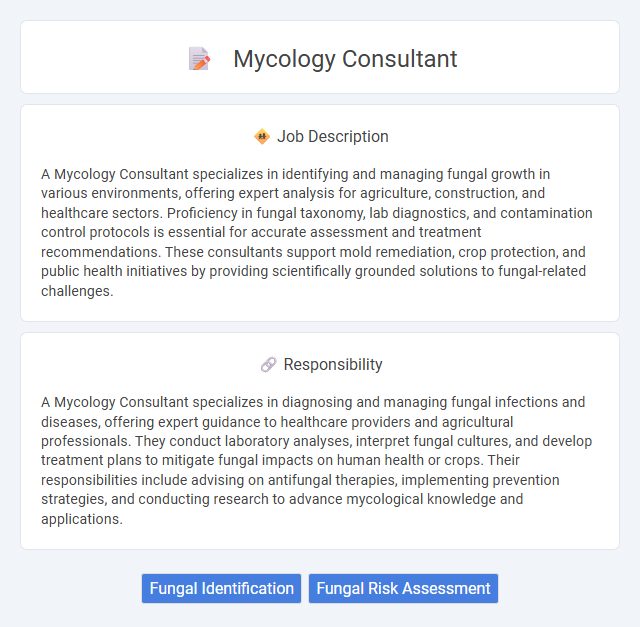
A Mycology Consultant specializes in identifying and managing fungal growth in various environments, offering expert analysis for agriculture, construction, and healthcare sectors. Proficiency in fungal taxonomy, lab diagnostics, and contamination control protocols is essential for accurate assessment and treatment recommendations. These consultants support mold remediation, crop protection, and public health initiatives by providing scientifically grounded solutions to fungal-related challenges.
Individuals with a strong interest in fungi and biology may likely find a Mycology Consultant role well-suited to their skills and passions. Those who are detail-oriented, enjoy research, and can work independently tend to thrive in this job, as it often requires thorough analysis of fungal samples and environmental conditions. People who prefer routine tasks and minimal scientific inquiry might not be as compatible with the dynamic, investigative nature of mycology consulting.
Qualification
A Mycology Consultant must possess a strong background in microbiology or biology, typically holding a bachelor's or master's degree with specialized training in fungal identification, pathology, and laboratory techniques. Expertise in diagnostic methods such as culture analysis, molecular biology, and mycotoxin detection is essential for accurate assessment and consultation. Proficiency in interpreting laboratory results and providing evidence-based recommendations to healthcare, agriculture, or environmental sectors enhances the consultant's value and effectiveness.
Responsibility
A Mycology Consultant specializes in diagnosing and managing fungal infections and diseases, offering expert guidance to healthcare providers and agricultural professionals. They conduct laboratory analyses, interpret fungal cultures, and develop treatment plans to mitigate fungal impacts on human health or crops. Their responsibilities include advising on antifungal therapies, implementing prevention strategies, and conducting research to advance mycological knowledge and applications.
Benefit
Mycology consultant roles likely offer significant benefits, including specialized expertise in fungal identification and management that can enhance agricultural productivity and public health outcomes. Professionals in this field probably gain access to cutting-edge research and advanced diagnostic tools, fostering continuous learning and professional growth. There is also a probability of competitive compensation packages due to the niche nature of mycology consultancy and its increasing relevance in environmental and medical sectors.
Challenge
A mycology consultant likely faces the challenge of accurately identifying diverse fungal species in complex environments, which may impact agricultural productivity and public health. Navigating rapidly evolving fungal resistance patterns could require continuous research and adaptation of treatment strategies. Balancing client expectations with scientific uncertainty might also present ongoing difficulties in delivering effective and practical solutions.
Career Advancement
Mycology Consultants specialize in fungal identification, growth analysis, and mycotoxin assessment, providing critical expertise to industries such as agriculture, pharmaceuticals, and environmental science. Career advancement opportunities include roles like Senior Mycology Consultant, Laboratory Manager, and Research Director, often requiring advanced degrees and published research in mycology. Mastery of molecular techniques and bioinformatics enhances prospects for leadership positions and collaboration on interdisciplinary projects.
Key Terms
Fungal Identification
A Mycology Consultant specializes in fungal identification, utilizing advanced microscopy, molecular techniques, and culture analysis to accurately identify fungal species in clinical, environmental, or industrial samples. Expertise in fungal taxonomy, pathogenicity, and resistance profiles enables consultants to provide critical insights for disease diagnosis, contamination control, and biotechnological applications. Their role often supports healthcare providers, agricultural specialists, and pharmaceutical companies by delivering precise fungal assessments and tailored mitigation strategies.
Fungal Risk Assessment
Mycology consultants specialize in fungal risk assessment by identifying and analyzing mold, yeast, and other fungal contaminants in various environments. They utilize advanced sampling techniques and laboratory analysis to evaluate potential health hazards and recommend mitigation strategies for homes, workplaces, and industrial sites. Expertise in fungal ecology and indoor air quality standards is essential to accurately assess and manage mold-related risks.
 kuljobs.com
kuljobs.com